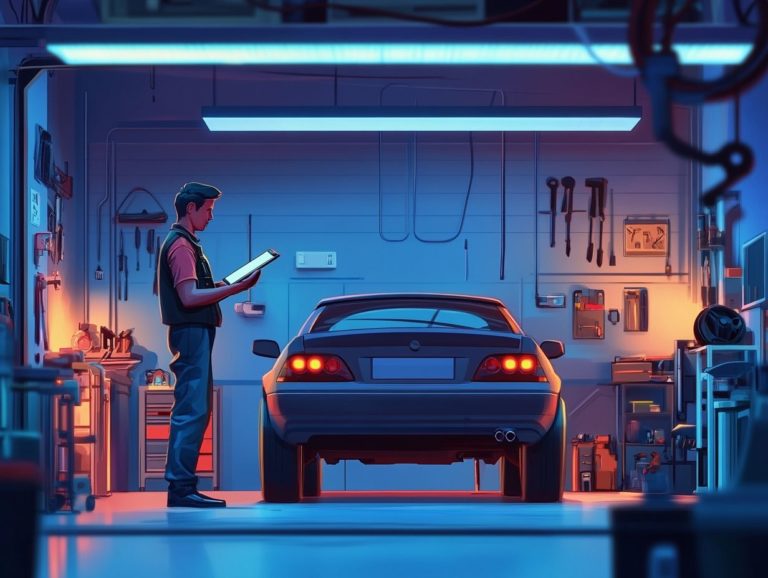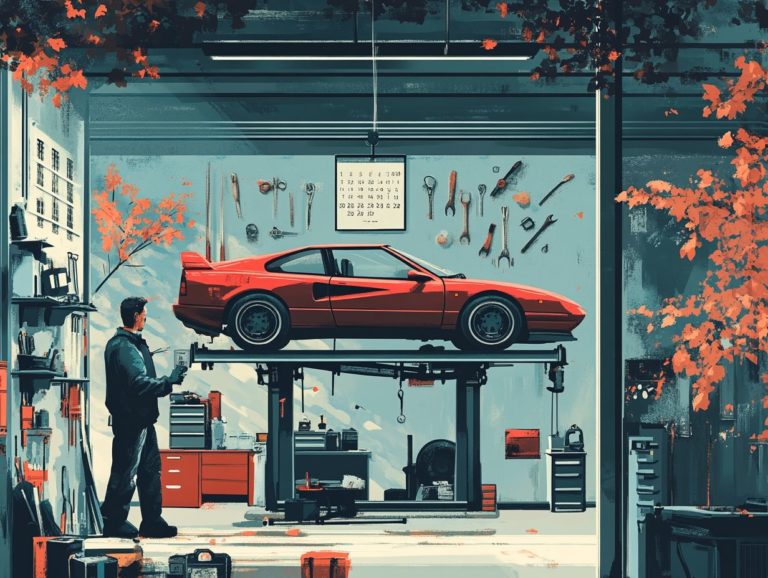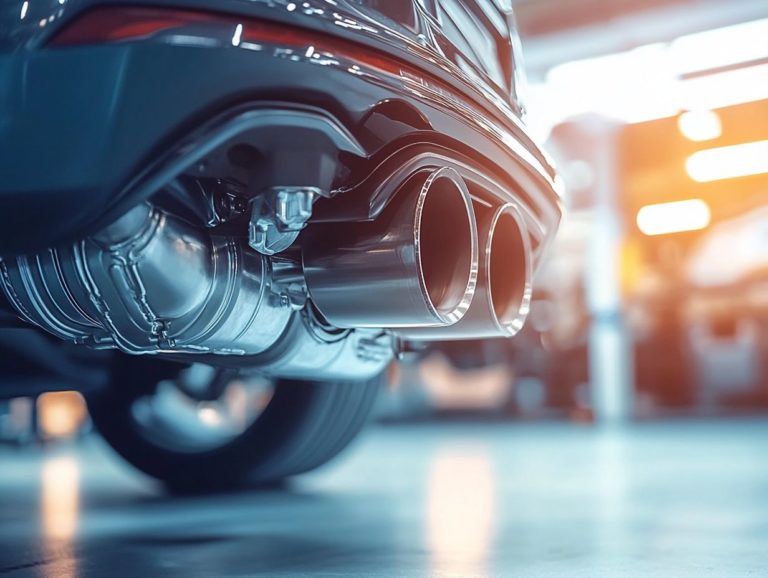Key Benefits of Getting a Car Inspected
When it comes to owning a car, prioritizing your vehicle’s safety and reliability is essential.
A comprehensive car inspection serves as your primary safeguard against potential problems and expensive repairs.
This article delves into the specifics of what a car inspection includes, highlighting its significance for compliance and safety, along with the myriad benefits of regular check-ups.
From grasping the various types of inspections to advice on choosing the right service, this guide equips you with everything necessary to maintain your car in peak condition.
Contents
Key Takeaways:
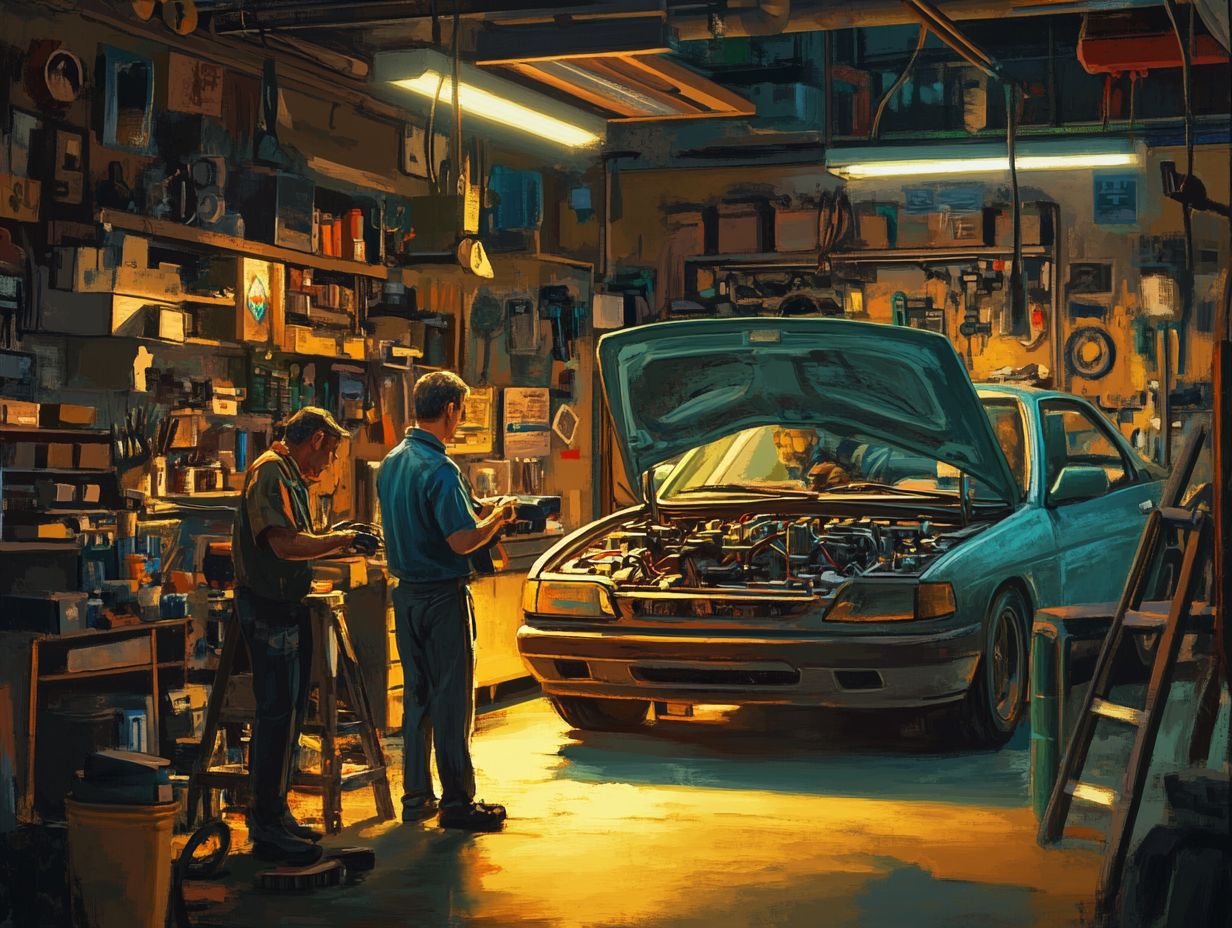
Regular car inspections ensure your vehicle is safe and compliant with regulations. They help prevent costly repairs and boost fuel efficiency. When selecting an inspection service, look at their reputation, experience, and costs.
What is a Car Inspection?
A car inspection is a detailed check of your vehicle to ensure it meets the safety and operational standards set by local authorities, like the Maryland Vehicle Administration (MVA).
During the inspection, technicians check critical components like safety belts and the exhaust system. They generate a report that shows if your vehicle meets safety standards and notes any needed repairs.
In Maryland, it’s essential for all vehicles, including passenger cars and light trucks, to undergo regular inspections at authorized stations to keep their registration up to date and ensure road safety for everyone.
Why is a Car Inspection Important?
Car inspections are essential for ensuring your vehicle s safety and reliability. They re designed to identify potential issues before they develop into serious problems that could jeopardize the safety of both you and your passengers.
Following state regulations is vital for responsible vehicle ownership. Neglecting inspection requirements can lead to fines and complications with your vehicle registration, so staying compliant is in your best interest.
Ensuring Safety and Reliability
Ensuring safety and reliability is one of your top priorities when it comes to vehicle inspections. These assessments are essential for identifying critical issues that could lead to accidents or breakdowns on the road.
Regular auto inspections significantly contribute to maintaining your vehicle’s optimal performance and longevity. By evaluating vital components such as brakes, tires, and the emissions system, certified inspections offer a comprehensive overview of your vehicle’s condition.
The inspection reports meticulously document findings, serving not just as a record of maintenance but also as a reflection of your vehicle’s safety history. These insights enable you to make informed decisions regarding necessary repairs or upgrades, ultimately fostering peace of mind and a commitment to road safety for everyone.
Complying with Regulations
Complying with regulations is essential for you as a vehicle owner, particularly in Maryland, where the Maryland Vehicle Administration (MVA) sets forth specific inspection requirements to ensure road safety.
These inspections aren t just bureaucratic hurdles; they act as a critical safeguard, ensuring that your vehicle meets necessary safety and environmental standards. Neglecting these regulations can result in serious repercussions, including hefty fines and complications during the vehicle registration process.
You might find your car flagged during routine checks, complicating things further when you attempt to renew your insurance or sell the vehicle. Understanding these compliance measures is crucial, as they play a significant role in safeguarding not only your personal safety but also the well-being of the entire community.
Benefits of Regular Car Inspections
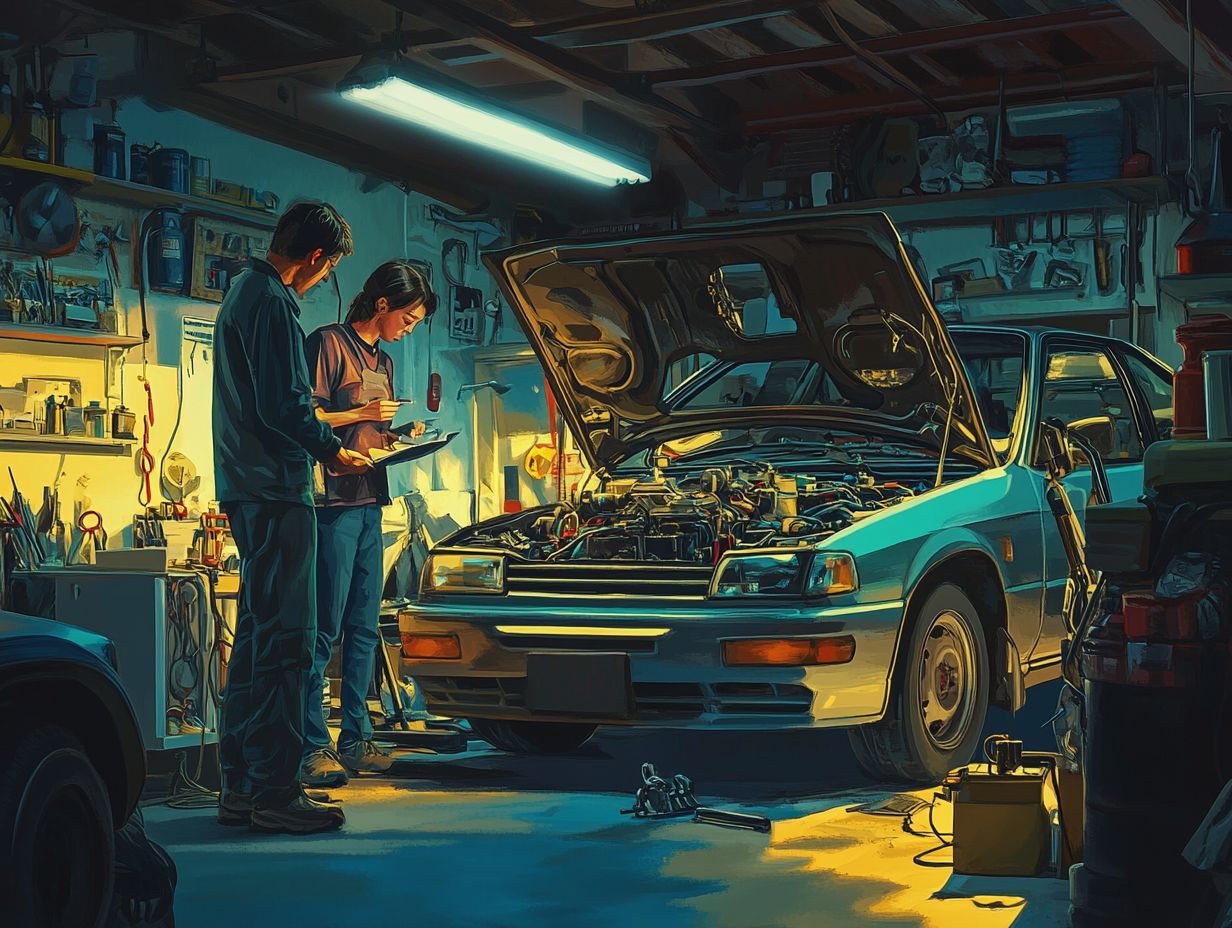
Regular inspections offer benefits beyond legal requirements. They help you catch issues early, saving you money on repairs and keeping your vehicle in great shape.
Additionally, these inspections contribute significantly to the overall maintenance of your vehicle, ensuring it remains in optimal condition for your peace of mind.
Early Detection of Issues
One of the most significant advantages of regular car inspections is the early detection of potential issues. Following the best practices for a car inspection allows you to prevent minor problems from turning into major repairs.
During these routine assessments, skilled auto mechanics carefully check various components of your vehicle. They look for problems before they escalate into costly breakdowns. The inspection process highlights worn-out parts and ensures that critical systems like brakes and tires are functioning at their best.
This foresight is essential. Addressing problems promptly can significantly reduce the need for extensive repairs.
By placing your trust in qualified mechanics during these inspections, you can enjoy enhanced safety and reliability on the road. This ultimately extends the lifespan of your automobile.
Preventing Costly Repairs
Preventing costly repairs is a major benefit of keeping up with regular car inspections. By identifying issues early on, you can save time and money, which is why car buyers need to know about inspections.
When you conduct thorough vehicle maintenance checks at scheduled intervals, you can catch potential problems before they escalate. Regularly reviewing the inspection report allows you to spot small leaks, worn-out brake pads, or tire issues that could lead to larger repair bills later on.
These proactive measures ensure a smoother driving experience and contribute to the longevity of your vehicle. Staying ahead of your maintenance needs fosters a sense of security, knowing that your vehicle is safe and reliable while minimizing the chances of unexpected breakdowns.
Improving Fuel Efficiency
Regular car inspections enhance your fuel efficiency by ensuring your vehicle operates at its best. This ultimately reduces emissions and boosts overall performance.
When mechanics conduct thorough evaluations, they pinpoint potential issues, like worn-out spark plugs, that can lead to problems in the fuel burning process. This not only increases your fuel consumption but also raises emissions.
The exhaust system helps your car release gases. If not maintained properly, it can affect performance.
By addressing these concerns through routine inspections, you contribute to better air quality by minimizing harmful emissions. Plus, you get to enjoy a smoother ride, which translates to lower fuel costs over time.
The link between proactive maintenance and enhanced vehicle performance is truly undeniable.
Essential Types of Car Inspections You Need to Know
You ll encounter various types of car inspections, each tailored for a specific purpose.
From pre-purchase inspections that carefully evaluate a vehicle’s condition before a sale to annual inspections required by state law, each type plays a crucial role in ensuring your vehicle remains in optimal condition and compliant with regulations.
Pre-Purchase Inspections

Pre-purchase inspections are essential for assessing the overall condition of a vehicle and ensuring it meets safety standards. This inspection gives you a detailed report on any potential issues.
These thorough evaluations are a crucial step for you as a prospective buyer, enabling you to make informed decisions before finalizing your purchase.
During these inspections, qualified professionals examine key components such as the engine, brakes, tires, and transmission. They ensure these parts align with established safety benchmarks.
They dive deep into the vehicle s structural integrity and review historical data for past accidents or repairs. By obtaining a detailed inspection report, you gain invaluable insights into the vehicle s current state, helping you negotiate better terms or sidestep costly repairs in the future.
Annual Inspections
Annual inspections are a crucial obligation for vehicle owners in Maryland, designed to meet safety inspection rules set by the Maryland Vehicle Administration. This is essential for maintaining valid vehicle registration.
These inspections serve two important purposes. They verify that your vehicle meets necessary safety guidelines and help identify potential issues before they escalate into serious hazards on the road.
You ll need to follow specific procedures, including having your vehicle evaluated each year to check vital components such as brakes, lights, and systems that reduce harmful gases from your vehicle. Adopting this proactive approach enhances community safety and aligns with environmental regulations aimed at reducing pollution.
By staying compliant with these inspection requirements, you can avoid penalties and ensure that your vehicle is roadworthy. This ultimately promotes a safer driving experience for everyone.
How to Choose a Car Inspection Service
Selecting the ideal car inspection service is essential for ensuring that your vehicle undergoes a comprehensive evaluation.
You’ll want to consider several key factors:
- The reputation of the inspection station
- The credentials of its registered mechanics
- The level of customer service provided
Making an informed choice in these areas will ensure your vehicle gets the attention it deserves.
Key Factors to Consider
When selecting a car inspection service, several factors deserve your attention: the station’s reputation, customer service, and competitive labor rates.
Each of these elements shapes your overall inspection experience. A station’s reputation serves as a benchmark for its reliability and the expertise of its technicians, directly influencing your trust and satisfaction.
Exceptional customer service can elevate your experience. Having your questions or concerns addressed promptly fosters confidence in the process. Don t overlook competitive labor rates, either.
They offer you a sense of value without sacrificing quality, ensuring you feel like you re making an informed decision.
By thoughtfully evaluating these aspects, you can confidently choose an inspection service that aligns with your expectations and needs.
Frequently Asked Questions
What are the key benefits of getting a car inspected?
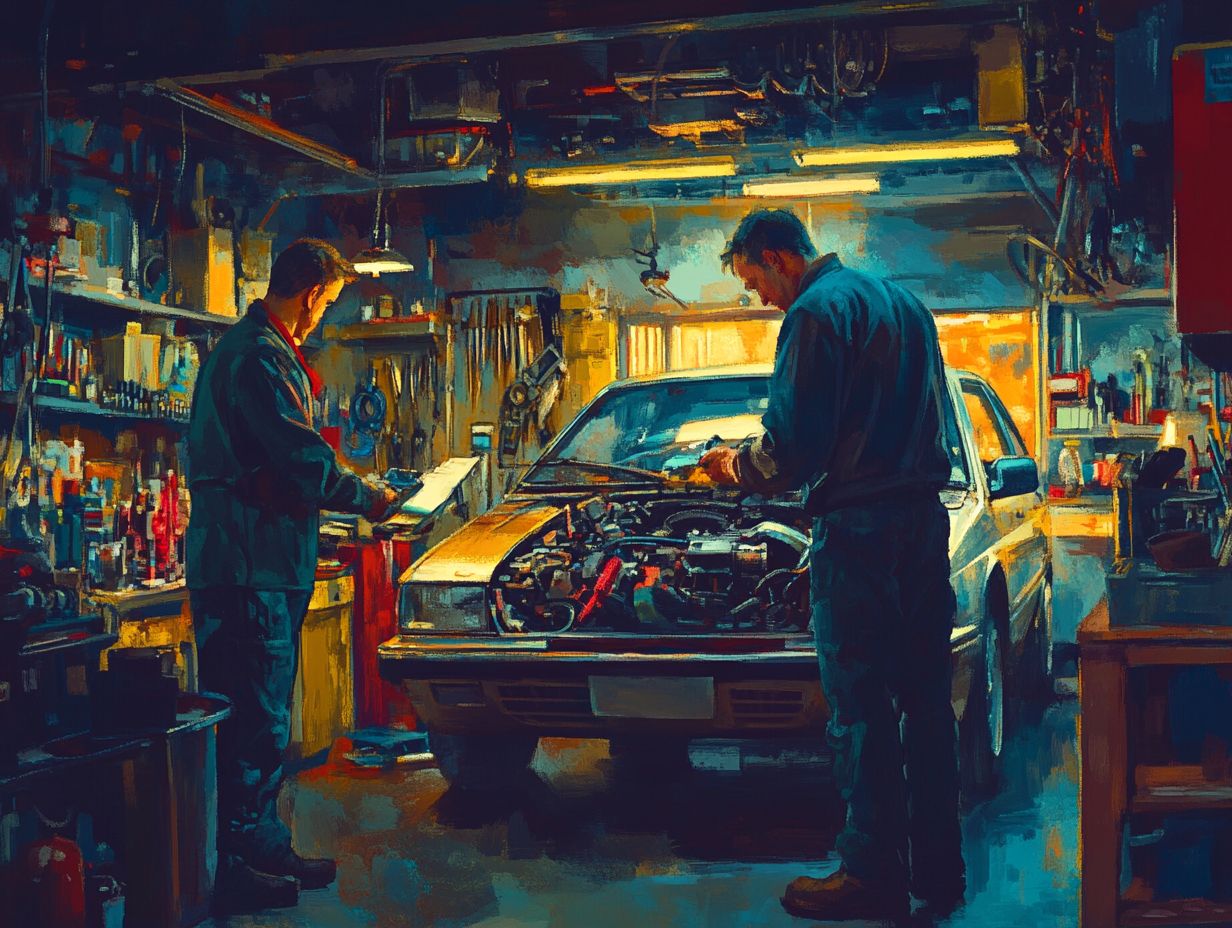
Getting a car inspected provides peace of mind and ensures the safety and reliability of your vehicle, highlighting the benefits of getting a pre-purchase inspection.
How often should I get my car inspected?
It is recommended to get your car inspected at least once a year or before any long trips or major repairs.
Can a car inspection save me money?
Yes, a car inspection can save you money in the long run by identifying potential issues before they become major and costly repairs. For insights on this process, consider the pros and cons of DIY car inspections.
Will getting my car inspected affect my insurance rates?
A car inspection usually doesn’t affect your insurance rates. However, if major issues are discovered, it may lead to an increase in premiums.
What does a car inspection typically include?
A car inspection typically includes checking the engine, transmission, brakes, tires, suspension, and overall vehicle safety.
Where can I get my car inspected?
You can get your car inspected at a trusted mechanic or dealership. You can also check with your state’s Department of Motor Vehicles for a list of approved inspection stations.
Don’t wait! Schedule your inspection today for better safety and peace of mind.

